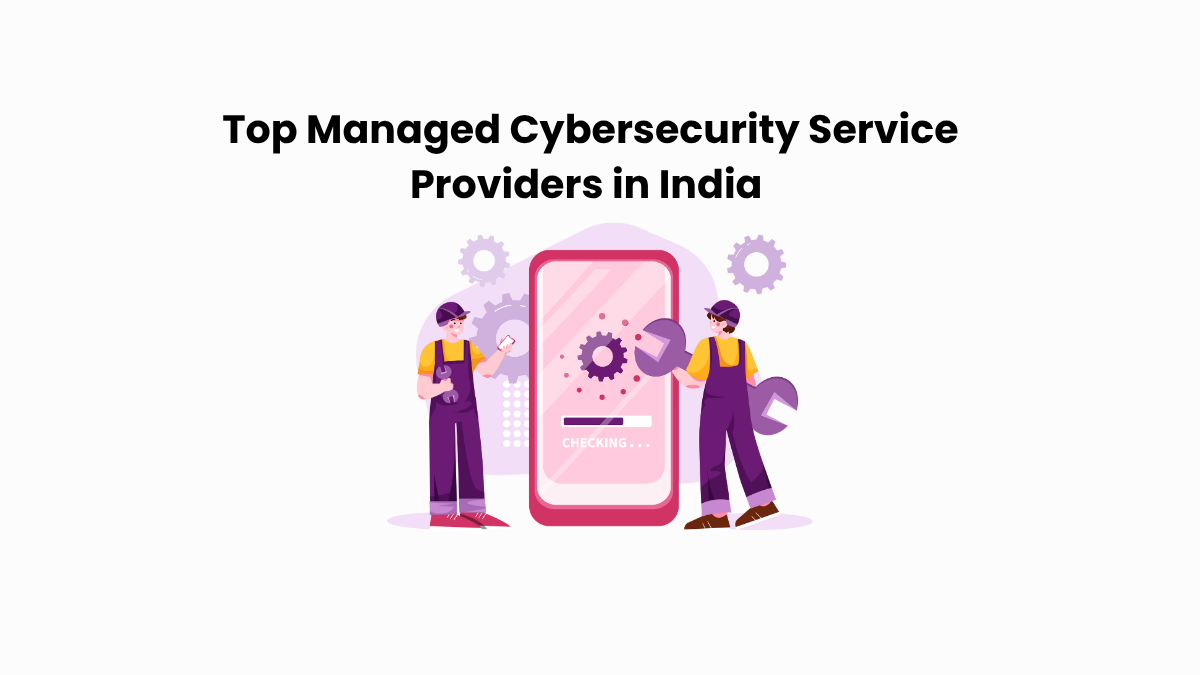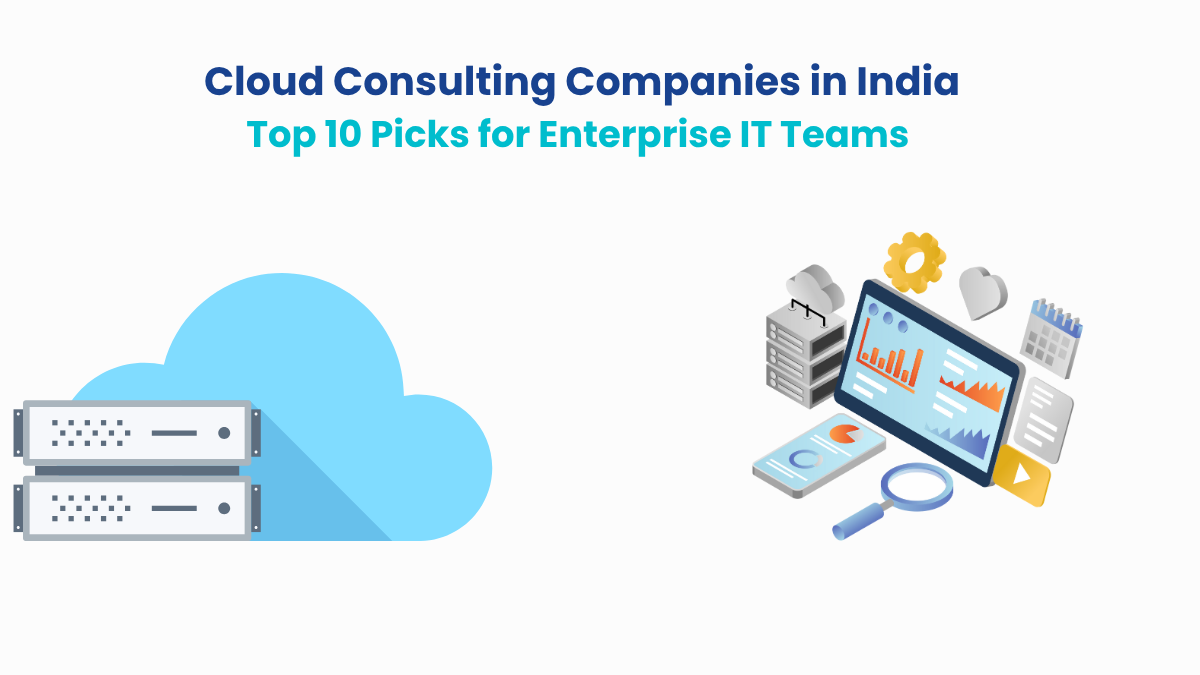Enterprises do not look for a managed cybersecurity service Provider in India because something has already gone wrong. They start looking when too many things are at risk of going wrong at the same time.
Say when the internal team is capable, but stretched thin. The security operations center is in place, but still missing critical signals. The compliance checklist is updated, yet the auditors keep flagging gaps. The business is expanding across cloud, on-premise, and third-party environments. The pressure to stay secure, stay compliant, and stay ahead is constant.
At some point, the question shifts. It is no longer about whether support is needed. It becomes about finding a partner who can help the organization mature faster than the risks around it.
That is where the right Managed Cybersecurity Service Provider in India steps in. Not one that simply manages alerts or installs tools, but one that brings complete protection across security monitoring, threat detection and response, compliance guidance, strategic advisory, and ongoing operations. A partner that strengthens the security posture without disrupting the way the business runs.
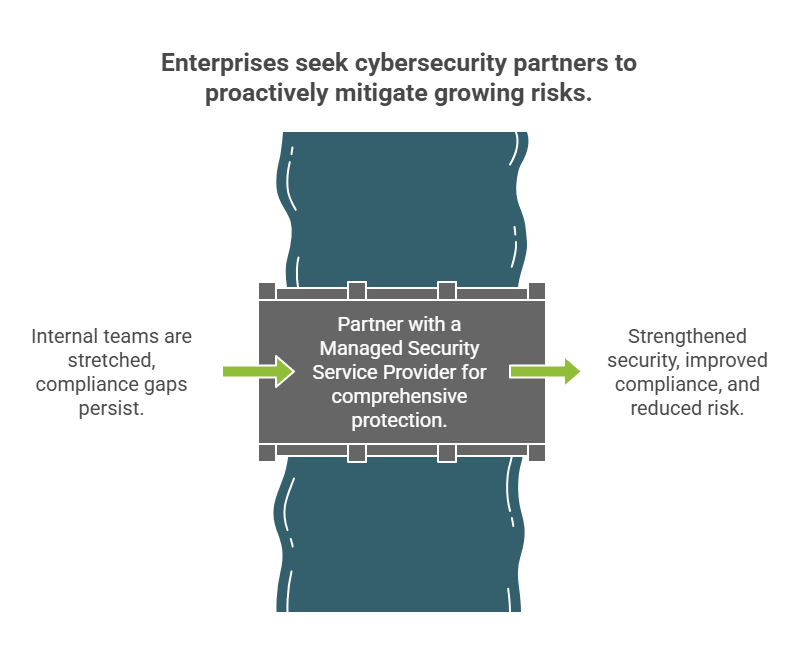
This guide is here to help you find those providers. The ones that do not just offer a service. The ones that offer clarity, capability, and control.
But before we go further, let’s establish this:
MSSP Is Not the Same as a Managed Cybersecurity Service Provider
It is easy to assume the two are interchangeable. After all, both offer managed services. Both claim 24/7 coverage. Both talk about SOCs and alerts and SLAs.
But there is a difference. And if you are evaluating providers for an enterprise environment, it is not a small one.
An MSSP focuses on the operational layer. They manage your firewalls, handle your SIEM, and route alerts to your team. Their job is to keep your tools running.
A true Managed Cybersecurity Service Provider goes further. They deliver managed detection and response. They guide you through compliance like DPDPA and ISO 27001. They offer vCISO support, tailor risk strategy, and help shape security programs that grow with your business.
They do not just monitor your systems. They improve your posture.
If your goal is real security maturity, and not just outsourced monitoring, you are not looking for an MSSP. You are looking for a partner who brings clarity, accountability, and depth. You are looking for the providers listed in this guide.
But before we go ahead, how do you make the right choice? These factors can help.
How to Identify the Right Managed Cybersecurity Service Provider in India?
Choosing a provider is not about who has the longest services list. It is about who can bring measurable resilience into your environment, without making your teams slower or your business harder to run. Here are the factors that matter when the stakes are real.
#1. Integrated Coverage Across People, Process, and Technology
Most providers will promise end-to-end support. Few can deliver truly integrated protection. The right provider aligns with your existing teams, builds on your existing stack, and enhances – not replaces – your existing workflows.
They should be able to plug into your existing cloud architecture, enforce policies through automation, and advise on gaps across configuration, governance, and team structure.
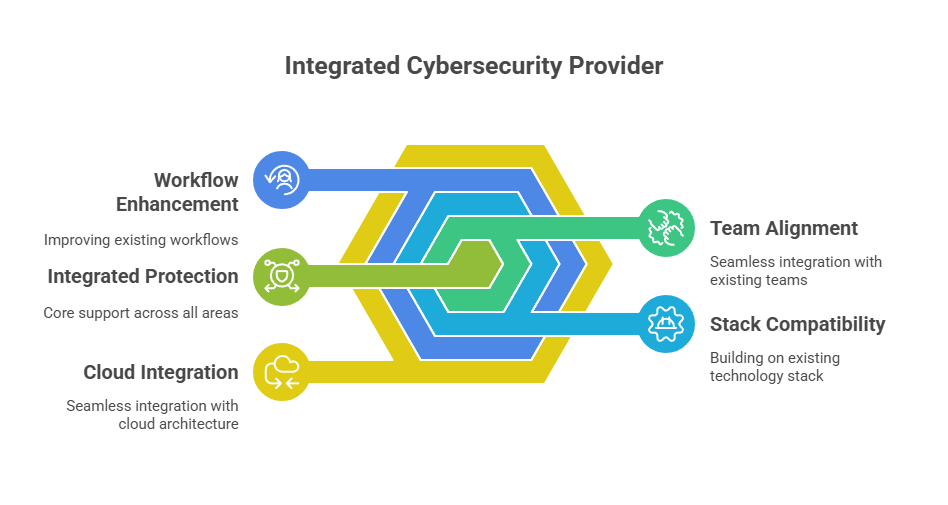
#2. Proven Capability in Detection and Response, Not Just Monitoring
Many vendors will show you colorful dashboards and call it visibility. But visibility is useless without action. The best providers deliver precision detection powered by threat intelligence, contextual correlation, and the ability to filter signal from noise.
And when a real incident occurs, they do not just escalate the alert back to you. They investigate, contain, and respond with clear documentation, timelines, and root cause analysis. You are looking for response maturity, not just reporting hygiene.
#3. Clear Ownership of Regulatory and Compliance Outcomes
Any provider can help you check a box. What you need is someone who understands the spirit and substance of compliance frameworks like DPDPA, ISO 27001, and PCI DSS and who can help you operationalize them without turning your team into policy administrators.
The best providers will co-own audit preparation, maintain evidence, and ensure that controls are monitored continuously. You do not want a provider who points to the shared responsibility model. You want one who leans in when the regulator calls.
Recommended Read: Looking to proactively reduce risk across cloud, third-party, and hybrid environments? Explore our 10 Essential Use Cases for Attack Surface Management eBook to understand how enterprise-grade ASM tools, like Cortex Xpanse, help providers go beyond monitoring into real-time discovery, prioritization, and remediation of security exposures.

#4. Real vCISO Involvement, Not a Rotating Advisor Model
A provider offering vCISO services should give you more than periodic presentations and templated policies. You need someone who acts as part of your leadership team, understands your sector, and helps define the security roadmap based on risk, not trend.
The vCISO should advise on board reporting, architecture tradeoffs, risk thresholds, and security investments. If they cannot do that, they are not a virtual CISO. They are just another consultant.
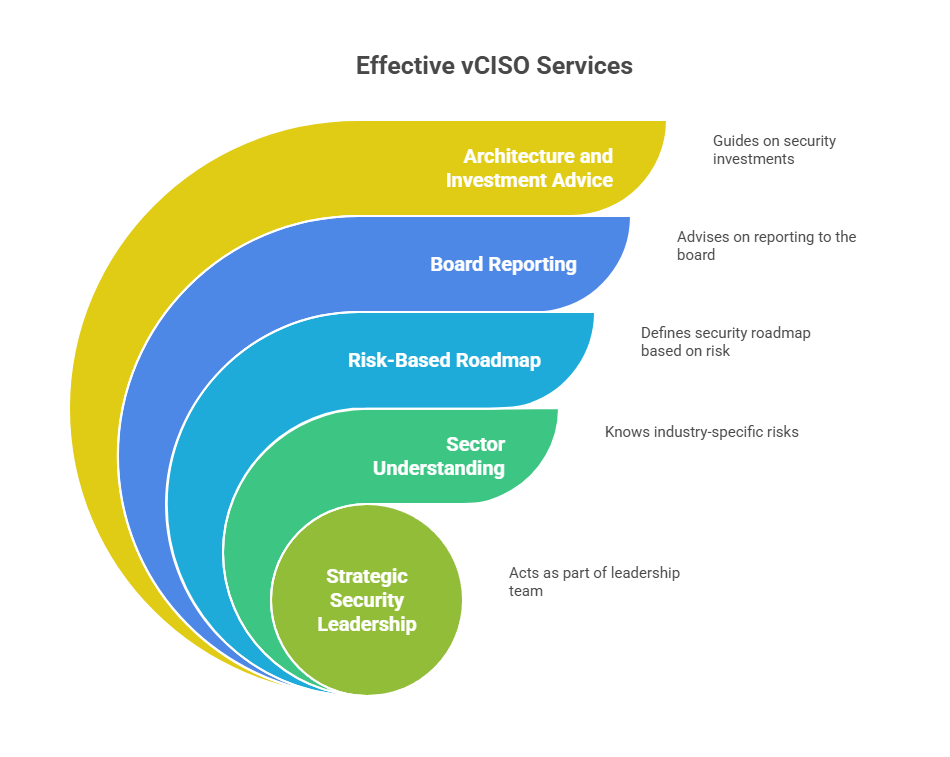
#5. Transparent Playbooks and Escalation Protocols
When an incident occurs, you do not want to figure out what happens next. You want to know exactly how your provider will act, who they will notify, what steps they will take, and when your team is expected to intervene.
Mature providers document their playbooks, share their logic, and tailor response paths to your environment. They do not treat you like a client. They operate like an extension of your internal team.
#6. Alignment with your Infrastructure and Cloud Strategy
A provider who forces you into their tooling, their ticketing, or their preferred integrations is solving their problem, not yours. You need to look for someone who can work with your stack, support your cloud-native or hybrid model, and align with your DevSecOps, infrastructure as code, and CI/CD realities.
The right partner also supports open integrations, brings cross-cloud expertise, and helps enforce guardrails inside engineering and IT workflows, not around them.
#7. Demonstrated Ability to Mature Your Security Program Over Time
The real test of a provider is not what they deliver in Month One. It is whether your posture improves in Month Seven.
A good idea is to look for evidence of structured maturity journeys. This means baseline assessments, roadmap planning, quarterly control reviews, and posture scoring. Further, ask how they measure improvement.
Do not hesitate to ask for instances of how they helped clients reduce incident volume, improve response times, or achieve a successful compliance audit under pressure.
Because a provider who cannot show that growth is just renting you talent. Not building your resilience.
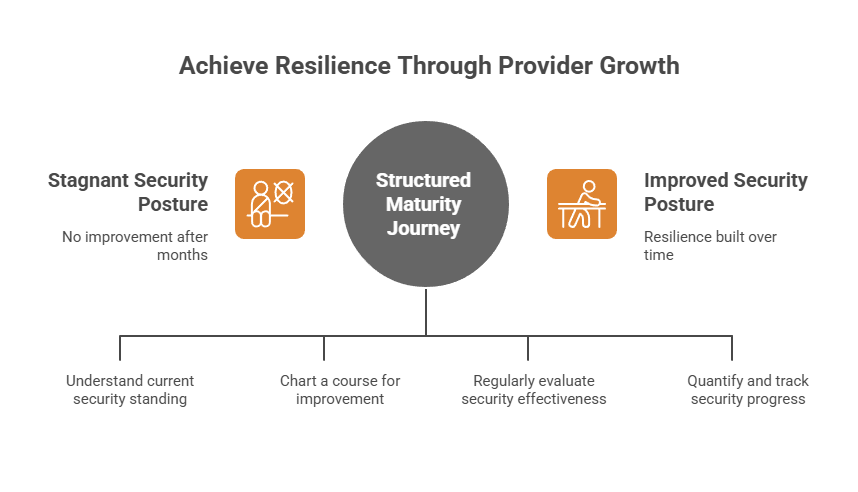
Now let’s look at some of the top managed cybersecurity providers in India for enterprises, starting with Datacipher Solutions.
#1. Datacipher Solutions
Datacipher stands out as a managed cybersecurity service Provider in India for enterprises that need more than outsourced monitoring. It serves as a strategic security partner that embeds with your team, aligns with your business goals, and owns the outcomes.
Whether you’re navigating compliance, securing a multicloud footprint, or maturing your detection and response program, Datacipher brings both operational strength and boardroom credibility.
Unlike typical MSSPs, Datacipher doesn’t just manage alerts. It delivers full-spectrum security operations, compliance readiness, vCISO-level guidance, and platform-agnostic engineering support designed to evolve with enterprise-scale infrastructure.
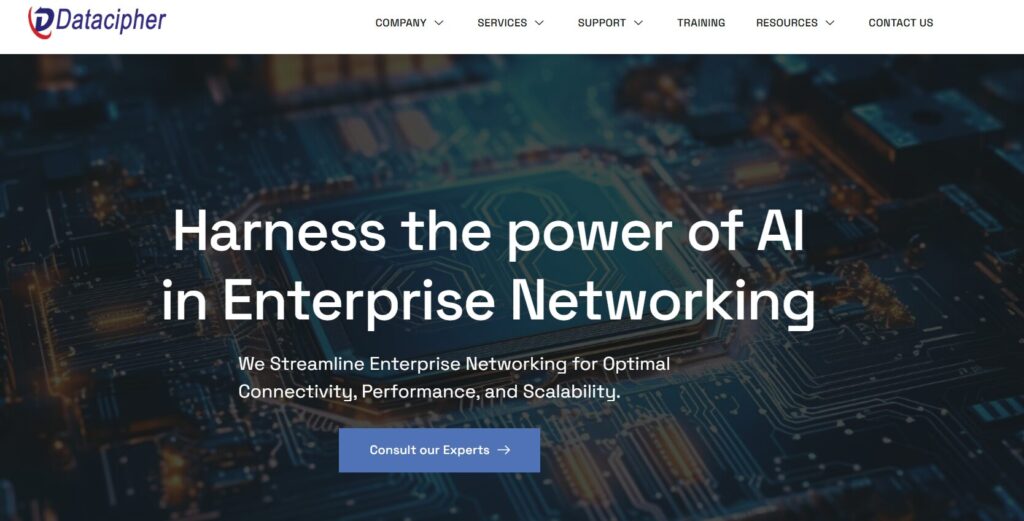
Source- Datacipher
Here’s What They Offer:
Datacipher’s services are built to meet the layered demands of enterprise security. Their core offerings include:
#1. 24/7 Security Operations Center (SOC)
Datacipher runs round-the-clock SOCs for continuous threat monitoring across cloud, on-premise, and hybrid environments. Their teams actively triage, investigate, and escalate incidents using threat intel, automation, and customer-specific playbooks, not just generic alert routing.
#2. Managed Detection and Response (MDR)
Their MDR service integrates endpoint, network, and cloud telemetry into a unified threat detection fabric. They use the MITRE ATT&CK framework to contextualize threats and execute rapid containment actions. Their team goes beyond detection by offering root cause analysis, forensic reporting, and guided remediation support.
Marketer’s Note: Want to see how Datacipher’s MDR works in action?
Here’s a short video walkthrough that shows how we protect large enterprises from evolving cyber threats using AI-driven detection, real-time response, and expert remediation.
#3. vCISO Services
Datacipher’s virtual CISO offering is not a token advisory call every quarter. It is a strategic engagement that includes security policy design, risk appetite definition, board reporting, control mapping, and ongoing security roadmap governance. They embed leadership-level security thinking directly into the client’s decision-making structure.
#4. Compliance and Certification Readiness
They guide enterprises through PCI-DSS, HIPAA, DPDPA, ISO 27001, NIST, and CIS controls with tailored audits, control gap analysis, and implementation support. Datacipher also builds repeatable compliance frameworks, ensuring organizations stay audit-ready, not just audit-passing.
#5. Third-Party Risk Management
They help enterprises assess, monitor, and mitigate vendor risks through formalized assessment processes, continuous monitoring, and access governance across third-party systems. This includes onboarding workflows, access reviews, and risk tiering based on business exposure.
#6. Cloud Security Operations Center (Cloud SOC)
Purpose-built for cloud-native environments, Datacipher’s Cloud SOC continuously monitors workloads, identities, configurations, and APIs across AWS, Azure, and GCP. The team proactively addresses misconfigurations, privilege escalations, and shadow IT with tight response SLAs and automated guardrails.
#7. Security Architecture and Zero Trust Advisory
Datacipher helps enterprises shift to modern architectures by mapping identity boundaries, enforcing least privilege, and integrating IAM, network segmentation, and data-centric controls. Their architecture reviews also guide secure-by-design DevSecOps adoption.
#8. Custom Detection Playbooks and Escalation Models
Rather than using canned playbooks, Datacipher works with your team to define thresholds, escalation flows, business context tagging, and SLAs ensuring high-fidelity detection and swift, predictable response across all scenarios.
#9. Engineering-Centric Security Integration
Datacipher is built for environments that already have internal teams and CI/CD pipelines. Datacipher plugs into existing tooling, supports API-based automation, and complements security engineering teams rather than bypassing or duplicating their work.
Datacipher is ideal for mid-sized to large enterprises with complex environments, high regulatory exposure, and internal security programs that need scale and expertise.. It is a strong fit for organizations that want deep integration, clear accountability, and a provider that can keep pace with infrastructure and business complexity.
#2. Tata Consultancy Services (TCS)
TCS is a leading Managed Cybersecurity Service Provider in India, with a proven record in enterprise-grade security management, detection, response, and compliance.
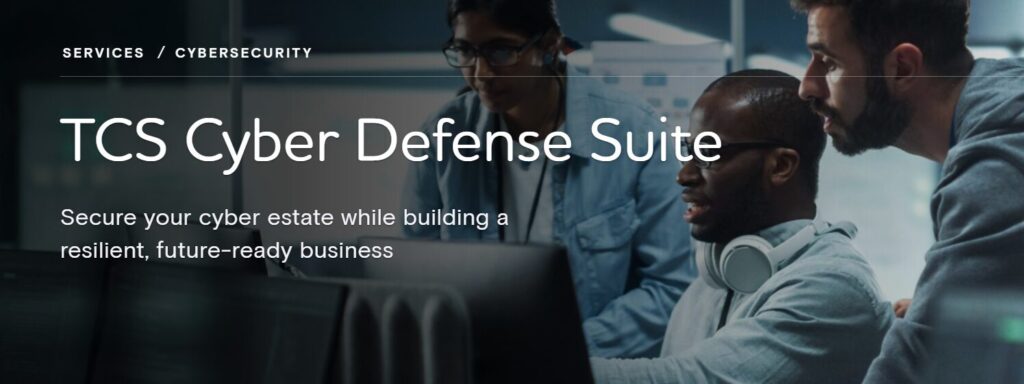
Source – TCS
It operates 24/7 Security Operations Centers that provide continuous monitoring, log analytics, incident containment, and vulnerability management in large hybrid environments.
Their MDR services includes AI-driven XDR across endpoints, cloud, IoT, and OT, complete with threat hunting, deception tactics, and automated remediation. TCS also offers Governance, Risk, and Compliance (GRC) services, covering frameworks like ISO 27001, PCI DSS, and DPDPA, supported by automated control mapping and audit readiness. Further, their cloud security transformation and vendor risk assessments ensure enterprise-level strategy and oversight.
Wipro is best suited for large and distributed enterprises seeking a scalable security partner that can handle complex infrastructures, multicloud operations, and evolving compliance requirements.
#3. Infosys
Infosys ranks among top-tier Managed Cybersecurity Service Providers in India, offering a robust balance of strategic depth, detection resilience, and compliance assurance tailored for enterprise needs.
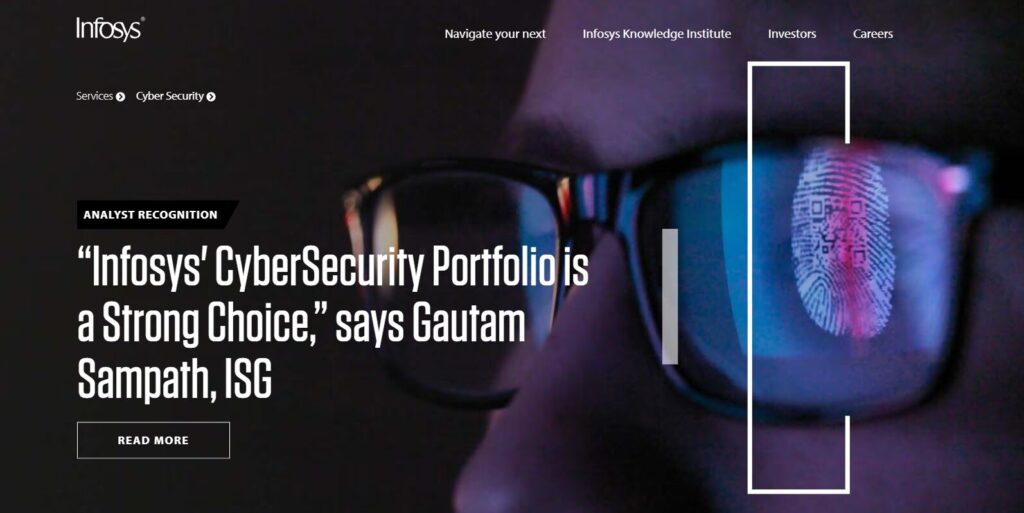
Source – Infosys
Its Cyber Defense Centers support round‑the‑clock SOC capabilities including SIEM, SOAR, threat intel, UEBA, and incident management. It is supported by AI-driven automation tools that enhance alert triage and containment. Their Cyber Next platform delivers integrated MDR services, combining XDR, threat hunting, deception, and rapid-response playbooks to reduce dwell time.
When it comes to compliance, Infosys drives automated governance programs across DPDPA, ISO 27001, NIST, PCI DSS, and OT standards. Their GRC CoE uses control mapping, audit workflows, and dashboard reporting to deliver continuous oversight. The company also offers vCISO advisory, risk quantification, cloud security architecture, and vendor‑risk governance.
Infosys is best suited for large enterprises with complex digital environments. Ideally in organizations where the goal is to embed security into every layer of operations and governance without disrupting delivery pipelines or scaling challenges.
#4. Wipro
Wipro offers truly integrated, enterprise‑grade protection that spans detection, compliance, cloud, advisory, and automation.
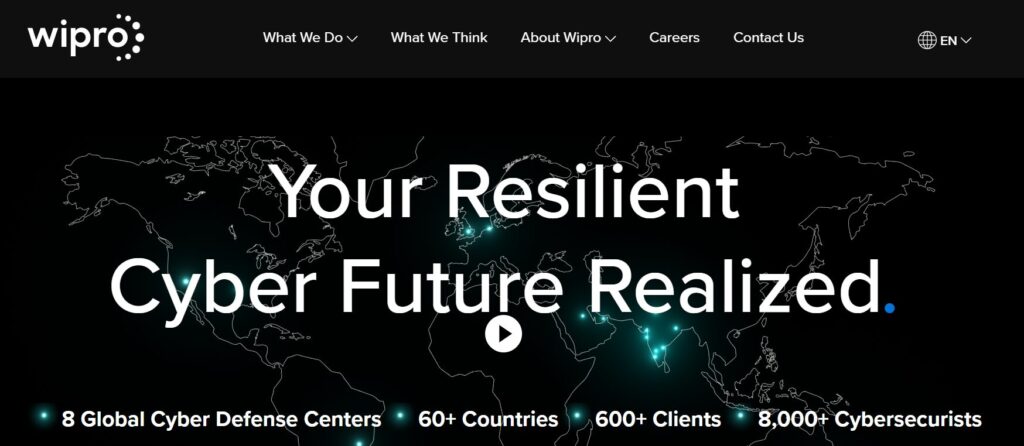
Source – Wipro
Its Cyber Defense Centers operate globally with teams monitoring logs, user behavior, endpoints, firewalls, and data loss prevention tools around the clock. They also perform threat and vulnerability assessments alongside real incident response services.
Wipro’s Modern MDR service, powered by Microsoft Sentinel and Defender XDR, combines SIEM, threat hunting, deception tactics, and 100+ automated playbooks to detect and neutralize threats in real time. Their CyberShield platform extends this coverage with cloud posture management, zero trust implementation, and continuous compliance monitoring across networks, applications, and endpoints.
Wipro also brings strategic capabilities, including cloud and security architecture advisory, DevSecOps integration, and vendor risk governance through its CyberTransform framework.
Wipro is best suited for large and distributed enterprises, especially those using Microsoft, cloud, or hybrid platforms. For companies that want a provider that can deliver modern MDR, enforce zero trust, and embed cyber awareness across operations and compliance, Wipro is a good choice.
#5. HCL Technologies
HCLTech is a seasoned Managed Cybersecurity Service Provider in India, built for enterprise-scale digital transformations encompassing hybrid, OT, and cloud environments. With global Cybersecurity Fusion Centers and AI-integrated threat analysis, HCLTech offers a unified and proactive approach to detection, response, and vendor governance.
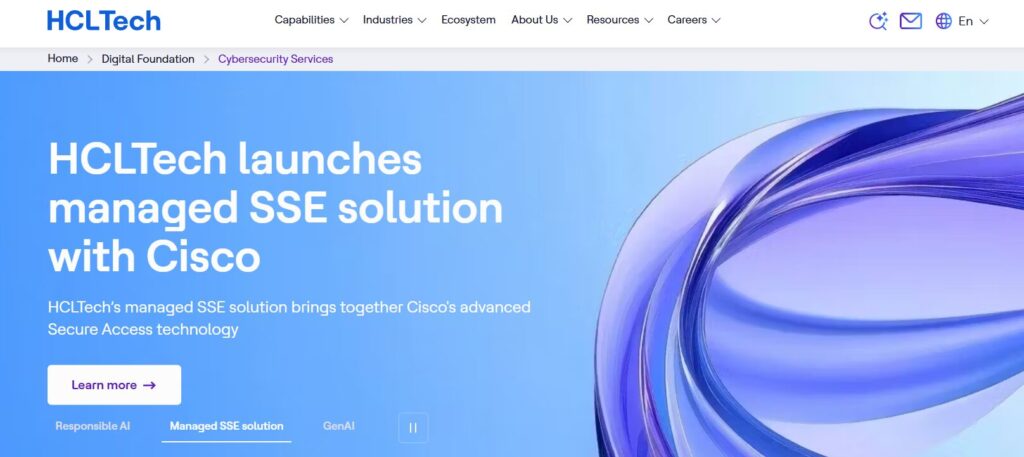
Source – HCLTech
Their Universal MDR platform handles telemetry from endpoints, cloud instances, IoT, and OT systems, using AI analytics and MITRE ATT&CK-based detection workflows to fuel 24/7 threat hunting and incident response. Backed by 10+ Cybersecurity Fusion Centers worldwide, their team operates around the clock to coordinate alerts and drive containment .
For compliance and governance, HCLTech supports ISO 27001, NIST, and privacy frameworks like DPDPA. Its third-party risk management services are delivered in partnership with ProcessUnity, offering vendor assessments, ongoing risk scoring, and policy automation.
The firm also advises on cloud security architecture and zero trust, partnering with vendors like Palo Alto Networks and Google Cloud to support hybrid and SASE deployments.
HCL is best suited for enterprises undergoing cloud, OT, or vendor risk transformation, where scale, governance, and integration with engineering teams are critical.
#6. Tech Mahindra
Tech Mahindra delivers enterprise-class cybersecurity with depth and real-world validation. Its services extend far beyond basic SOC monitoring, combining detection, validation, architecture support, and risk intelligence to support organizations with hybrid clouds and complex third-party ecosystems.
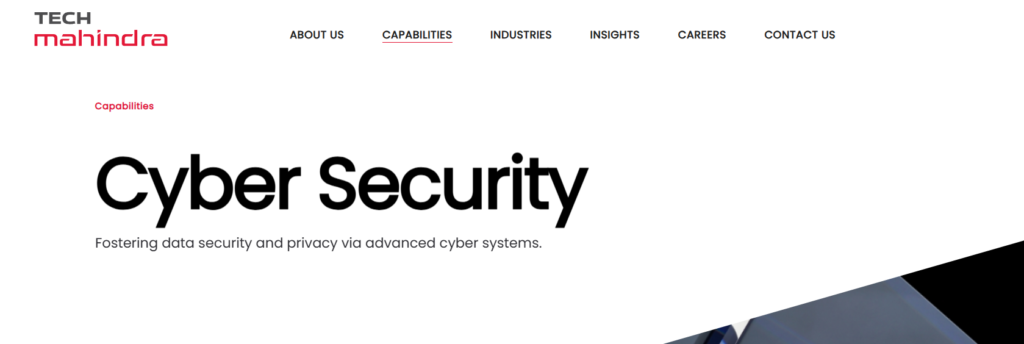
Source – Tech Mahindra
Their 24/7 SOC and MDR stack includes SIEM, SOAR, user behavior analytics, threat feeds, phishing detection, vulnerability scanning, and incident response across endpoints, networks, and clouds .
On governance, Tech Mahindra supports vendor risk through continuous monitoring powered by UpGuard-like integrations. Their advisory services include drafting ISO 27001, DPDPA, and NIST-aligned policies, and designing secure cloud and SASE architectures based on Cisco and ColorTokens frameworks .
It is best suited for large and rapidly evolving enterprises that require ongoing threat validation, vendor oversight, and a secure-by-design architecture across hybrid landscapes.
#7. LTIMindtree
LTIMindtree combines two powerhouse brands to deliver centralised, enterprise‑grade security across digital ecosystems. Their AI‑driven Cyber Defense Resiliency Centers enhance threat response with generative AI, threat hunting, and real‑time incident remediation.
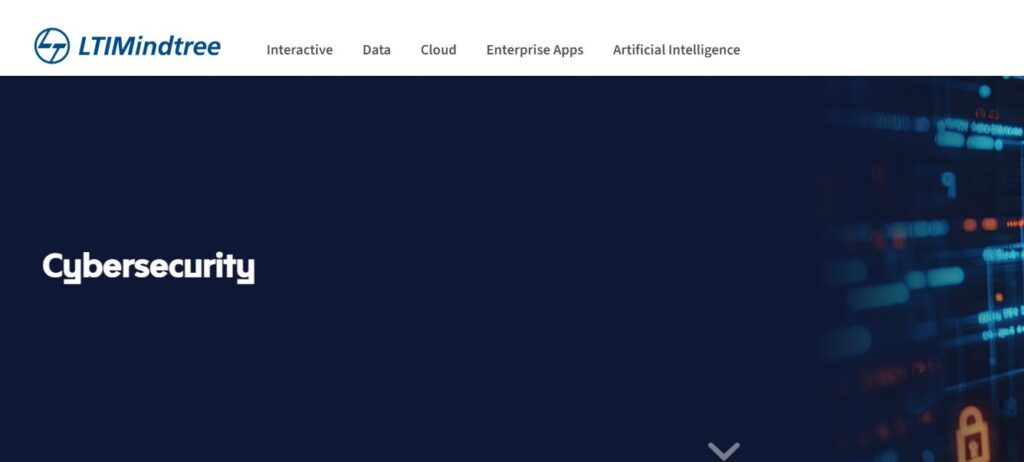
Source – LTIMindtree
The firm offers Managed Security Services spanning SIEM, UEBA, cloud threat protection, IoT/OT defense, Active Cyber Resilience, and GRC. These are delivered via cyber ops centers across its global footprint – including Mumbai and Bengaluru –and powered by internal use cases and accelerators.
Its Cyber Risk Management service uses AI analytics and automation to assess vulnerabilities at host, application, and business levels. This enables quick threat prioritisation and emergency patch triage.
In partnership with Microsoft, LTIMindtree supports advanced hybrid cloud security using Defender XDR, Sentinel, and CIEM frameworks, alongside zero‑trust and SASE deployment models.
It is best suited for global enterprises with hybrid or cloud‑native infrastructure. Especially those facing OT convergence or requiring AI-led SOC intelligence and resilience.
#8. Tata Communications
Tata Communications is a robust Managed Cybersecurity Service Provider in India, offering enterprises a comprehensive and integrated security framework, powered by global scale and local compliance.
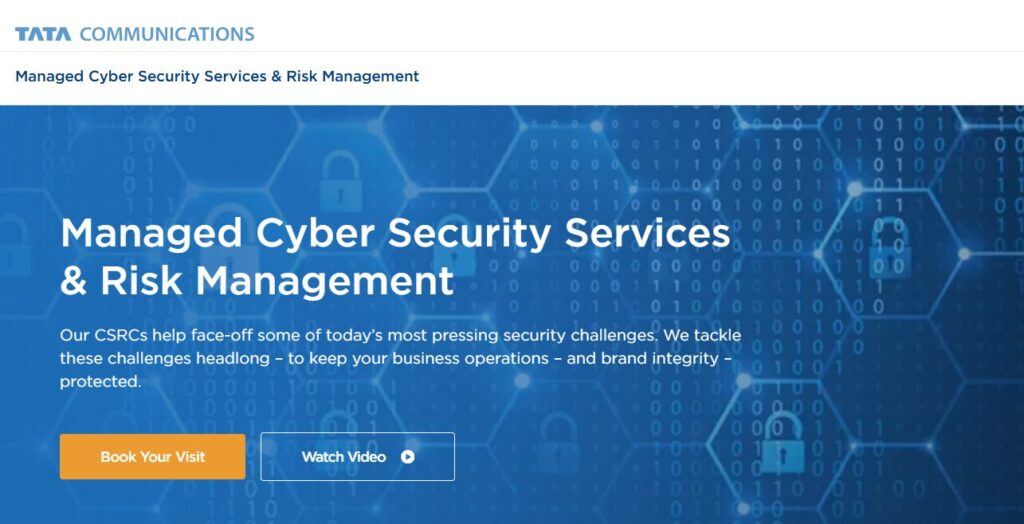
Source – Tata Communications
With award-winning Managed Detection and Response capabilities, they bring automated, AI-enhanced detection and response across IT and OT environments.
Their security operations are backed by a full suite of managed services, including endpoint protection, SOAR playbooks, UEBA, threat intelligence, and vulnerability management.
Their cloud compliance is equally strong, with certifications across ISO27001/17/18, SOC2, PCI DSS, HIPAA, GDPR, and more. Their GRC offerings include maturity assessments, vulnerability testing, red teaming, and third-party risk evaluation. The firm’s strategic alliance with Palo Alto Networks enables unified, cloud-delivered SASE and zero trust architectures in support of hybrid workforce demands.
Tata Communications integrates deep telecom infrastructure know-how with modern cybersecurity engineering. They are scalable, globally aligned, and locally relevant for enterprises facing complex regulatory and operational challenges.
It is best suited for enterprises that require secure hybrid operations, strong regulatory alignment, and agile security delivery powered by a global backbone.
Recommended Read: MDR vs MSSP: What’s the Right Fit for Your Enterprise?
#9. IBM Security
IBM Security combines global infrastructure, deep intelligence, and local delivery, making it one of the most capable cybersecurity partners for enterprises in India.

Source – IBM
It operates a Security Operations Center in Bangalore that delivers 24/7 monitoring, detection, and response powered by SOAR, SIEM, and advanced automation.
Its MDR service uses AI-driven threat hunting and hybrid coverage across endpoints, networks, and cloud environments.
IBM also supports governance, risk, and compliance, with tools that automate risk assessments, control mapping, audit readiness, and regulatory reporting. Their X‑Force penetration testing and red teaming, paired with consultative services through IBM Consulting, ensure proactive exposure management and continuous SOC maturity. IBM’s cloud compliance capabilities, including ISO, SOC, PCI DSS, GDPR, and Indian data residency standards, make it a strong choice for hybrid‑cloud enterprises .
IBM is best suited for large and complex enterprises, especially those operating in regulated industries, multi‑cloud environments, and mission‑critical infrastructure.
#10. Accenture
Accenture brings enterprise-scale cybersecurity solutions to Indian organizations, delivering end-to-end services from threat detection to strategic advisory and managed response.
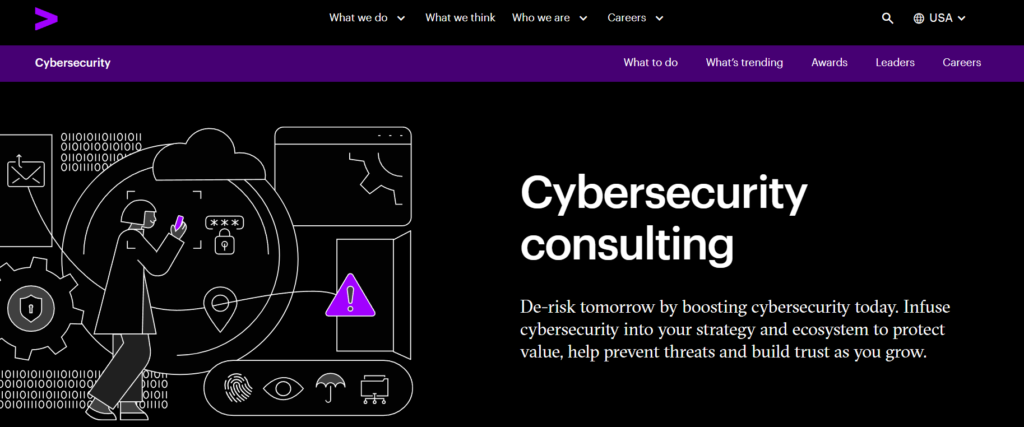
Source – Accenture
Its Cyber Fusion Centers, including one in Bengaluru, operate 24/7 to monitor, detect threats, and coordinate incident response using global X-Force intelligence and automation.
Their Managed Extended Detection and Response incorporates SIEM, SOAR, AI-driven threat intelligence, and real-time incident handling powered by generative AI.
Its governance and compliance practice automates control mapping and audit readiness across ISO 27001, DPDPA, PCI DSS, and more . The firm also offers strategic security architecture advisory, threat simulation, and incident readiness through cyber ranges and vCISO support.
Accenture is best suited for large enterprises with distributed systems, hybrid cloud, and high regulatory burdens that want AI-augmented threat detection, real-time response, and governance aligned with global best practices.
#11. Deloitte
Deloitte stands among the most capable advisory-led providers in India, blending strategic guidance with operational cybersecurity services to build resilient, compliant, enterprise environments.

Source – Deloitte
Deloitte’s Cyber Risk Managed Services offer 24/7 threat monitoring through global Cyber Intelligence Centers, combined with ongoing vulnerability management, phishing detection, and automated threat intelligence.
As part of its MXDR (Managed Extended Detection and Response) offering, Deloitte embeds threat hunting, detection, response, and remediation into a unified managed service that’s tailored to enterprise risk profiles. Their Cyber Incident Readiness and Response practice supports proactive planning, simulation, rapid containment, and recovery.
On the advisory side, Deloitte provides executive-level cyber strategy and governance programs aligned with secure, vigilant, and resilient models, and GRC services that map frameworks like ISO 27001, NIST, and SEBI CSCR for India’s regulated sectors. They also assist with building holistic threat management programs, combining cyber resilience, vendor oversight, and breach readiness.
Deloitte is best suited for large enterprises in heavily regulated industries with evolving cyber risk needs.
#12. KPMG India
KPMG in India offers a comprehensive suite of managed cybersecurity services, from detection and compliance to strategic governance.
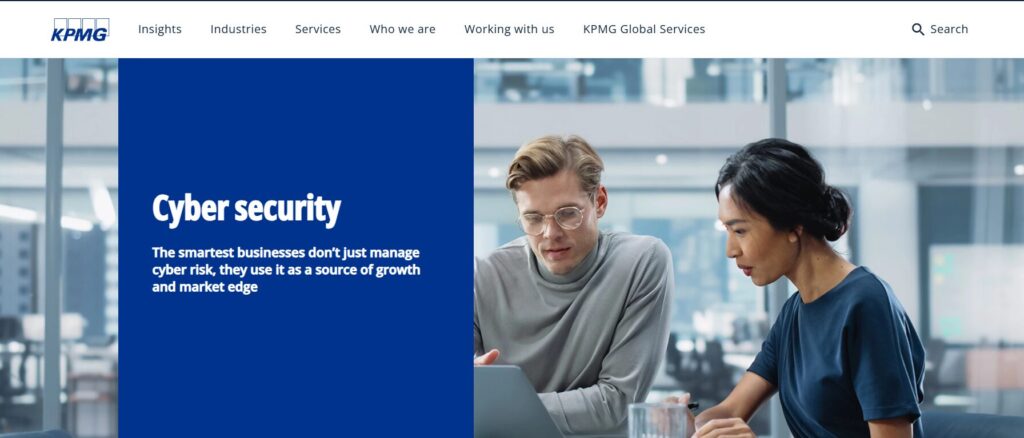
Source – KPMG
Their Cyber Managed Services program includes 24/7 SOC capabilities, SIEM monitoring, automated control frameworks, and incident response. They provide a dedicated MDR offering, combining human‑led threat hunting, machine‑leaning analytics, and rapid containment across IT and OT environments.
For regulatory readiness, KPMG supports access management, vulnerability management, third‑party risk evaluation, and audit preparedness. Their Cyber Assurance services include cloud and ERP security assessments, red teaming, IoT/OT testing, and continuous exposure monitoring.
On the strategic front, KPMG in India helps define cyber maturity models, zero‑trust frameworks, GRC integration, and incident readiness through tabletop exercises and advisory services.
KPMG India is best suited for large enterprises in regulated sectors that require a managed cybersecurity partner capable of blending operational resilience with strategic oversight and emerging‑tech protection.
#13. PwC India
PwC India delivers deep operational capabilities combined with strategic advisory services. This makes them a go-to choice for enterprises that need cohesive cybersecurity and compliance programs.
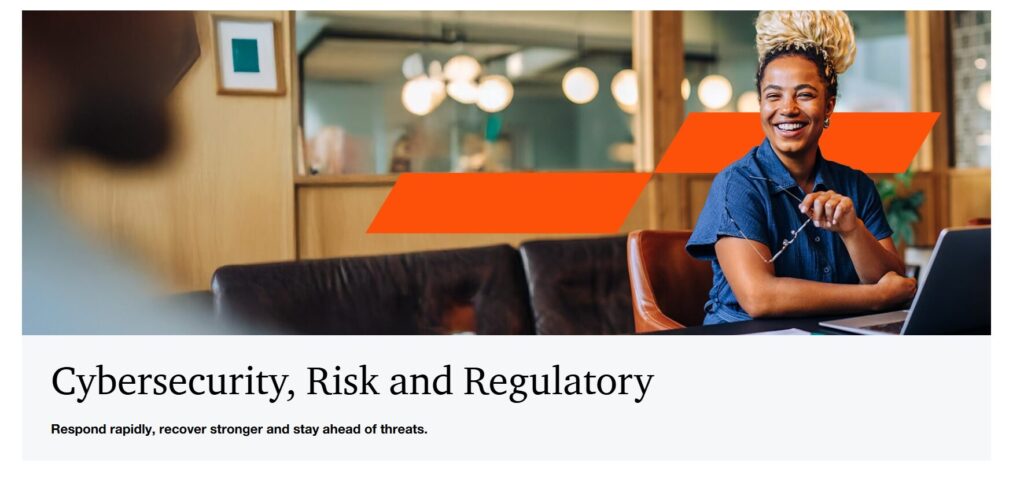
Source – PwC
PwC’s Managed Detection and Response includes round-the-clock SOC monitoring, threat intelligence feeds, and automated triage. Their Cyber Protection Centre is equipped with behavioral analytics, malware analysis, forfeiture tools, and real-time threat hunting.
On the GRC side, PwC India supports frameworks like ISO 27001, DPDPA, NIST, and GDPR. They offer continuous control assessments, privacy management, vendor risk reviews, and audit readiness via an expert team based in India and global delivery hubs.
PwC also embeds architecture, zero-trust, and identity governance advisory into its cybersecurity program. Their managed services extend into incident response, dark web monitoring, attack surface management, and security orchestration .
PwC is best suited for large enterprises that want a provider combining SOC operations with advisory-led maturity, forensic expertise, and sustained compliance oversight.
#14. Cognizant
Cognizant is a major player in enterprise cybersecurity, offering a holistic MDR approach powered by its Cyber Threat Defense platform. This platform ingests data from endpoints, networks, and user behavior analytics, delivering proactive threat identification and response.
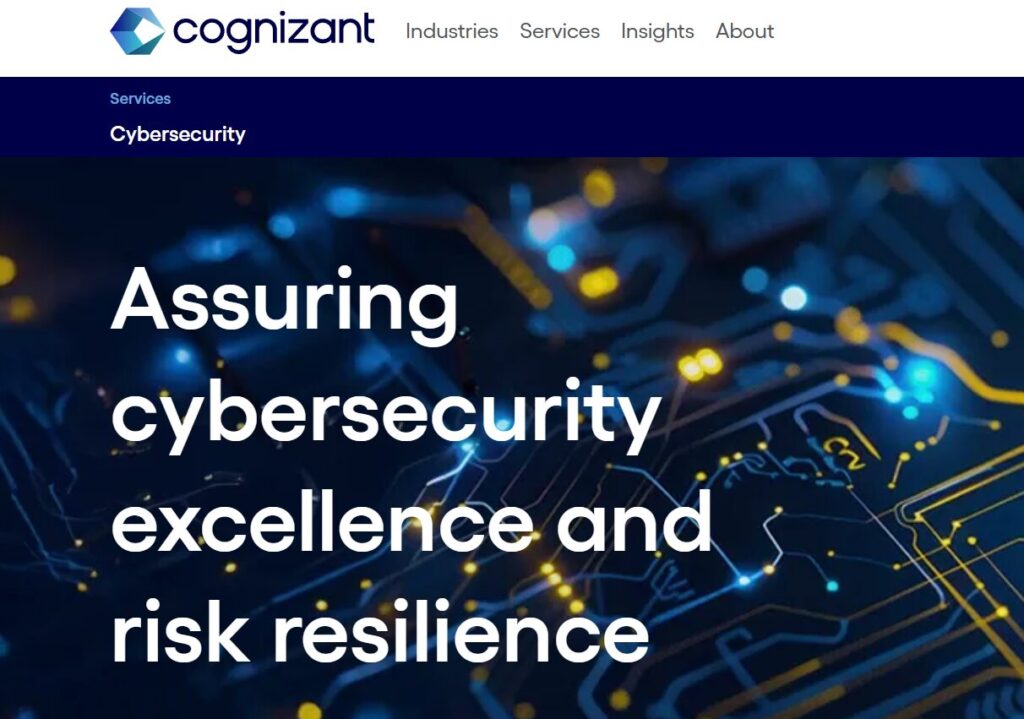
Source – Cognizant
Cognizant has recently launched Cognizant Neuro® Cybersecurity, an AI-powered orchestration layer that connects tools, vulnerability and threat data, and compliance processes, enabling adaptive risk management at scale.
Their CTD service integrates SIEM, SOAR, and threat hunting with real-time incident investigation support and dark‑web monitoring.
The firm’s global reach, strong engineering background, and integration capabilities make it a reliable option for enterprises with complex environments.
There’s No One-Size-Fits-All in Enterprise Security
Enterprise security needs don’t come in standard sizes. Neither do the providers in this space.
Some enterprises want a partner who can embed seamlessly into existing engineering pipelines. Others need someone who can take ownership of regulatory risk across global regions. A few are looking to rebuild from scratch – cloud-first, compliance-driven, and fast.
That is why this guide includes different types of players. Some lead with detection and response. Others focus on governance, cloud posture, or third-party risk. And a few like Datacipher, go beyond the template, offering deep integration across all three: people, process, and platform.
Ultimately, you are not seeking the most impressive feature set. You are looking for the provider who aligns with your maturity, your infrastructure, your compliance thresholds, and your internal capabilities.
The next section walks you through what makes Datacipher stand out in that context.
Why Datacipher Is the Best Managed Cybersecurity Service Provider in India?
At Datacipher, we don’t treat security as a service ticket. We treat it as a shared mission.
While larger providers bring scale, we bring precision. We work like an embedded team, aligning with engineering, advising the boardroom, and delivering outcomes, not dashboards. Where global players rotate advisors, we stay hands-on.
Just this year , a mid-size fintech client who faced back-to-back compliance audits while expanding into a multi-cloud setup approached us. We deployed a tailored Cloud SOC, implemented cross-cloud policy guardrails, embedded a vCISO, and resolved the top five audit flags within 60 days.
That’s the kind of execution that builds long-term trust. Whether it’s managed detection, compliance, or security architecture, Datacipher brings clarity and control where others bring complexity.
If you’re an enterprise looking for a partner who adapts with you, not just services you, your search ends here. Talk to our experts to see how we can help secure your enterprise.

